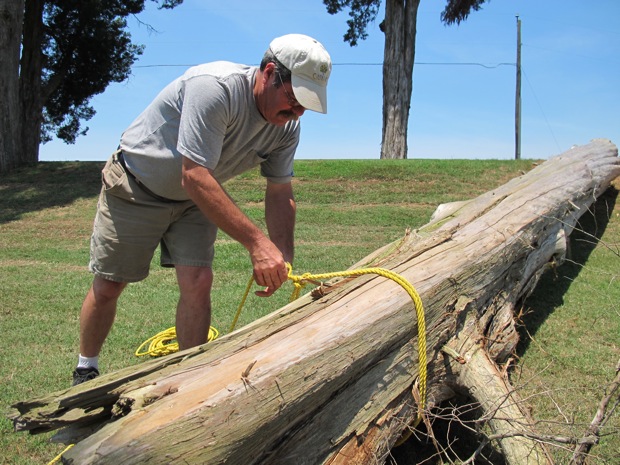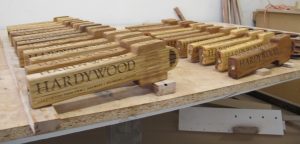The massive storms that cut through the Richmond area in the past couple of weeks wreaked havoc on the area’s trees.
For one local entrepreneur, that’s not necessarily bad news.
CitiWood founder Ed Bath makes everything from small wood-slip bookmarks to full-scale furniture at his 3,000-square-foot Richmond workshop. But Bath never buys preprocessed wood. Instead, he uses only dead and fallen Richmond-area trees.
“I use whatever falls down,” Bath said. “The trees pick me. I don’t pick them.”
Bath has been getting about a call a day about fallen trees, a pace that he says usually keeps up for a few months after a big storm hits.
Bath, 55, did accounting and information technology work for LandAmerica for 12 years until he was laid off in November 2008, just weeks before the firm folded.
But Bath had already been thinking about starting a business of his own and turning his 30-year woodworking pastime into a profession.
“It’s a hobby gone wild,” he said. “I took a hobby to its illogical conclusion.”
Bath founded CitiWood in 2009, using a sawmill he already owned and a solar-powered kiln he built himself. The only major piece of equipment he needed was a small crane he attached to a trailer to help lift downed timber.
The “treecycling” process, as Bath calls it, begins when he gets a call about a dead or fallen tree. He takes his truck and trailer to pick up the timber, which he hauls home to be cut and dried using his sawmill and kiln.
Drying the wood is the most time-consuming part of the process, Bath said. Oak, for example, takes about 28 days to dry out.
Bath then fashions the wood into finished products at his Eubank Road workshop before sending it off to National Marking Products in the Lakeside neighborhood for engraving.
About 80 percent of Bath’s business comes from individuals, who order mementos such as small, customized blocks or engraved wood plaques. The other 20 percent comes from contracts with other businesses.
Bath said his most interesting project to date was a seven-foot-long gum wood table he made for Hardywood Park Craft Brewery. In May, Gov. Bob McDonnell signed two bills into law on the table Bath made. Bath also produces tap handles and coasters for Hardywood.
Despite the uptick in calls and the abundance of downed trees in the area, Bath said he hasn’t been collecting more trees than usual, because he’s well stocked on most types of wood.
Some woods, however, are not in such high supply. Bath said he could use some white oak or gum. Sycamore is the toughest wood to come by.
“They don’t seem to fall down much,” Bath said.
Bath recently hired CitiWood’s first part-time employee, and he says there’s always enough work to keep them busy. In the future, Bath hopes to spread the word about “treecycling.”
Although he might be at capacity, trees are still coming down.
“Every time we have a storm, just think of how many tables we could make,” Bath said.
The massive storms that cut through the Richmond area in the past couple of weeks wreaked havoc on the area’s trees.
For one local entrepreneur, that’s not necessarily bad news.
CitiWood founder Ed Bath makes everything from small wood-slip bookmarks to full-scale furniture at his 3,000-square-foot Richmond workshop. But Bath never buys preprocessed wood. Instead, he uses only dead and fallen Richmond-area trees.
“I use whatever falls down,” Bath said. “The trees pick me. I don’t pick them.”
Bath has been getting about a call a day about fallen trees, a pace that he says usually keeps up for a few months after a big storm hits.
Bath, 55, did accounting and information technology work for LandAmerica for 12 years until he was laid off in November 2008, just weeks before the firm folded.
But Bath had already been thinking about starting a business of his own and turning his 30-year woodworking pastime into a profession.
“It’s a hobby gone wild,” he said. “I took a hobby to its illogical conclusion.”
Bath founded CitiWood in 2009, using a sawmill he already owned and a solar-powered kiln he built himself. The only major piece of equipment he needed was a small crane he attached to a trailer to help lift downed timber.
The “treecycling” process, as Bath calls it, begins when he gets a call about a dead or fallen tree. He takes his truck and trailer to pick up the timber, which he hauls home to be cut and dried using his sawmill and kiln.
Drying the wood is the most time-consuming part of the process, Bath said. Oak, for example, takes about 28 days to dry out.
Bath then fashions the wood into finished products at his Eubank Road workshop before sending it off to National Marking Products in the Lakeside neighborhood for engraving.
About 80 percent of Bath’s business comes from individuals, who order mementos such as small, customized blocks or engraved wood plaques. The other 20 percent comes from contracts with other businesses.
Bath said his most interesting project to date was a seven-foot-long gum wood table he made for Hardywood Park Craft Brewery. In May, Gov. Bob McDonnell signed two bills into law on the table Bath made. Bath also produces tap handles and coasters for Hardywood.
Despite the uptick in calls and the abundance of downed trees in the area, Bath said he hasn’t been collecting more trees than usual, because he’s well stocked on most types of wood.
Some woods, however, are not in such high supply. Bath said he could use some white oak or gum. Sycamore is the toughest wood to come by.
“They don’t seem to fall down much,” Bath said.
Bath recently hired CitiWood’s first part-time employee, and he says there’s always enough work to keep them busy. In the future, Bath hopes to spread the word about “treecycling.”
Although he might be at capacity, trees are still coming down.
“Every time we have a storm, just think of how many tables we could make,” Bath said.


What a great idea.
Mr. Bath, I have a couple of Gum trees that are still standing that you are welcome to!!
Ed, you can have the two huge gum trees in my yard, however they have not fallen yet. We will even help to take them down and you won’t have to move the branches we will, you can just take the trunk of the trees!